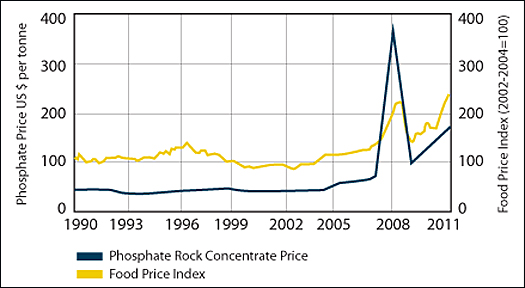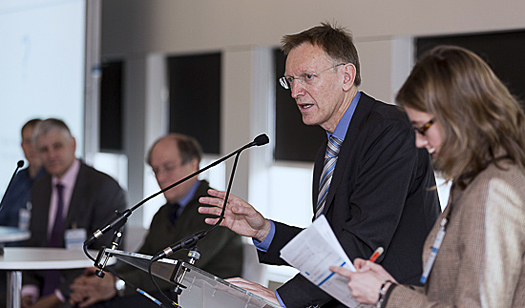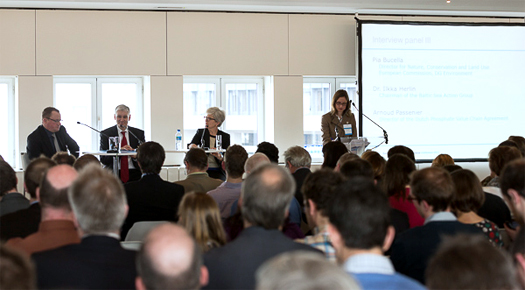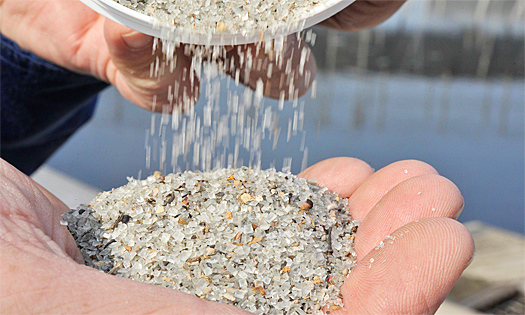ESPC2013: EU-commissioner Janez Potocnik calls phosphorus recovery a hard economic interest
The recovery of phosphorus from waste streams, including the sludge from waste water treatment plants, does not only trade off to the environment but is also economically interesting.
This message was delivered by EU-commissioner Janez Potočnik at the 1st European Sustainable Phosphorus Conference in Brussels on March 6 and 7.
The conference was organized by the Phosphorus Platform, an initiative of the joint European partners throughout the whole phosphorus value chain, strongly support by the Dutch Nutrient Platform.
Solving an environmental problem today, saving money tomorrow
Potočnik affirmed that the supplies of phosphorus are likely to last for many years. "But it is also true that we are already becoming victims of price volatility. That is a clear signal that waiting to deal with the problem is not a sensible option. And dealing with the problem today can help us save money tomorrow."
The EU commissioner launched a Resource Efficiency Roadmap in 2011, a new EU policy to become less dependable on the import of raw materials from outside Europe, including phosphorus rock. Virtually all phosphorus in Europe is imported from mines located in Morocco, the US and China.
Less oxygen in surface water
Phosphorus in human and animal waste leads to water pollution. Too high concentrations of nitrates and phosphates hamper the improvement of the quality of many European surface waters. In stagnant waters and coastal zones this eutrophication leads to algae bloom. As the algae is short-lived the decay process consumes much dissolved oxygen in the water.
Algae bloom also causes turbidity, reducing the clarity of surface water. Some algae groups are toxic.
The main route for phosphate into the surface water is via industrial and municipal waste water and run off or leach from farmland, containing fertilizers.
No philanthropy
Although the waste of phosphorus is an environmental problem, Potočnik emphasized the economic benefits of recovery. He was glad to see at the conference that companies and knowledge institutions, see phosphorus recovery as an opportunity to create jobs and create growth.
"All around the conference yesterday you could hear businesses explaining the hard economic interest behind the actions they are taking, not philanthropy!", said the commissioner.

Phosphate improves crop yields and gets plants to mature faster. There is no substitute for it. So if the food prices go up, the price of phosphate goes up too.
(source: Agora Financial)
Create an European market
"The recycling and sustainable use of phosphorous is an issue that is becoming more and more prominent in political and business discussions. I support this fully. But there is still a lot to do", according Potočnik
"The challenge now is to move on, to take this successful event and use it to build structures and find solutions that really develop phosphorus recycling and its more efficient use. We should aim to have a market across the EU for the different forms of recycled phosphorus. We should aim for precision farming techniques to become standard across many different types of agriculture. We should aim to be using much more of this resource that is available to us in the EU."
Potočnik is working on a Green paper on the sustainable management of phosphorus. The paper is to start a formal public consultation by the European Union with all stakeholders, to be followed by a white paper that will deliver the new EU policy.
The EU commissioner expected the release of the Green paper on phosphorus within a few weeks.
An impression of the first day of the European Sustainable Phosphorus Conference in Brussel on March 6
Arno Rosemarin from the Stockholm Environment Institute explains the many challenges of phosphate rock, the main source of phosphorus used in fertilizers, running out.
Dutch potato processing company Aviko recovers valuable phosphates from its waste water with the Phospaq and Anammox processes.
See the exhibited business cases of phosphorus recovery at the conference, on the website of the Phosphorus Platform.
Read the full speech by EU environmental commissioner Janez Potočnik on the website of the European Union.
Read earlier news items on phosphorus recovery on this website:
- Dutch take lead in phosphorus sustainability, October 4, 2011
- Stockholm water week: Nutrient recovery from feces needs large scale approach, August 31, 2012
More information
The Phosphorus Platform
The Hague, the Netherlands
+31 70 307 37 00
www.phosphorusplatform.eu






